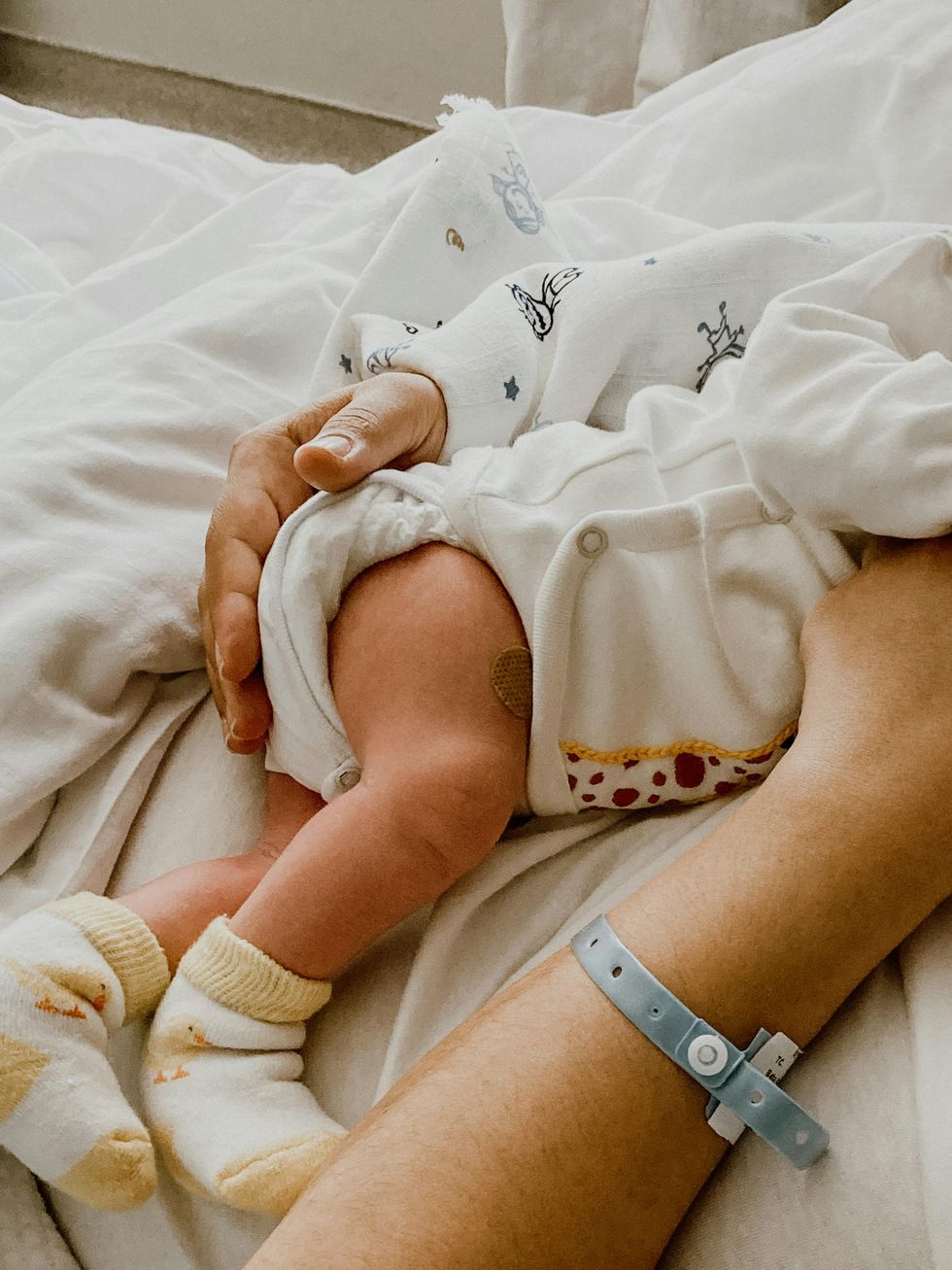Everything you wanted to know about this major surgery and recovery, answered!
The 8 Best Ways To Navigate A C-Section Recovery, According To An OBGYN
Staff Writer, Jasmine Williams, covers a variety of topics from home decor to beauty and everything in between. She has bylines at Motherly, The Everymom, and Byrdie where she wrote about motherhood, beauty, health and relationships. Jasmine knew she wanted to be a writer when she realized she was actually interested in reading the articles in her mom's favorite magazines — and she may or may not have ripped her favorite articles out to study them later. When she's not working, you can find Jasmine playing make-believe with her toddler, spending an undisclosed amount of time in Target or TJ Maxx, and searching for a family-friendly puppy to add to her family.
Before my sister announced she was pregnant again, I kept thinking about the process of giving birth and recovery. It seemed like it was such an odd thing to fixate on given my strong stance on waiting to TTC (try to conceive) until my son turns 5, but I guess I could sense someone close to me was expecting. That's not even the part that freaked me out though.
When my sister shared she's having a C-Section, I couldn't help but research recovery tips for this major procedure — I wanted to know how to help her heal. And I wanted other moms to know what they can do to help themselves, too! I reached out to Dr. Jillian LoPiano, OBGYN and Chief Health Officer at Wisp, to understand everything you need to know about C-Sections and how to recover from one!
What factors determine if someone will need a C-Section?

While some moms have vaginal deliveries and others go on to receive C-sections, it's important to know that one isn't 'better' than the other — all births are valuable and valid. The only question that matters in this case is, "What determines if someone needs a C-Section or not?"
"There are a number of maternal fetal factors both in the perinatal period and during labor that can cause a provider to recommend a C-Section. Common indications are baby position (such as breech position) or placental abnormalities are common indications," says Dr. LoPiano.
These abnormalities can be:
- Placenta Previa
- Placenta Accreta
- Placenta Increta
- Placenta Percreta
What resources do patients need before their C-Section?

No question is too silly to ask your doctor, but Dr. LoPiano says you should receive all the information you need regardless of the delivery method.
"If a CS [C-Section] is planned, or there is a known indication for this mode of delivery, then this would be discussed during prenatal care and at hospital admission," she adds.
From their your provider will go over the "surgery, indications, risks, benefits and alternatives through the process of informed consent." This is usually when you'll also receive recovery tips and what else you should expect.
What can patients and their support partners expect the day of a C-Section?

Even if you've watched every episode Grey's Anatomy or House, you may not know all the ins-and-outs of having a C-Section. To be clear, Dr. LoPiano says that delivering via a Cesarean means you'll be having "abdominal surgery" that's "performed in an operating room."
'If it is a planned procedure, the patient will arrive and be prepped for surgery with an IV, neuraxial anesthesia placement, and preoperative medications and fluids. The support partner can expect a briefing on the surgery and under most circumstances is allowed in the OR after anesthesia is deemed in place and adequate with mom and baby stable," she says.
For anyone who's not aware, what occurs during a C-Section?

Unless you've watched demonstrations on YouTube, you could be clueless about how C-Sections are actually performed. Dr. LoPiano says, "An incision is made in the lower part of the abdomen and carried through to the uterus. An incision is then made in the uterus to deliver the baby and the placenta is delivered. The uterus is repaired and then each layer of the abdomen is closed in succession."
In other terms, there are literal layers to a C-Section, which is why it's considered a major surgery.
Are moms required to stay in the hospital longer after having this procedure?

I had the option of staying another 24 hours in the hospital after a vaginal birth, but I chose to leave after just one day left the hospital just one day — I was ready to sleep comfortably in my own bed. However, C-Sections have a little bit of a different timeline!
Dr. LoPiano explains, "In general uncomplicated vaginal deliveries are discharged home the next day or the day after. C-Sections are generally discharged on postoperative day 2 or 3 depending on mom and baby’s clinical scenarios."
How long does it take to recover from this procedure?

Postpartum recovery looks different for everyone, but the rules are a little different after you've had a C-Section. "Since it is abdominal surgery, no lifting beyond 5 pounds is recommended along with no exercise beyond walking for 6 weeks in order to allow all of the layers of the abdomen that were repaired to heal," says Dr. LoPiano.
This isn't the time to be superwoman and force yourself to get back to 'normal.' Even something like "returning to work or exercise after 6 weeks" should be taken at a pace you're comfortable with, according to Dr. LoPiano.
"However, this is strictly from a surgical standpoint. There are many factors that go into postpartum or 'fourth trimester' wellness that need to be addressed and most providers and advocates advocate for longer family leave for this reason," she says.
How can a mom's support village help her as she recovers?

I will probably scream this from the mountaintops forever, but moms need as much support as they can get during postpartum. Not only is their body physically healing, but there's the drop in hormones that they have to deal with while learning to care for a newborn. Some things are instinctual, but that doesn't mean a mom should have to figure things out by herself. This mirrors what Dr. LoPiano says about the recovery period.
"It is important that a mom’s 'support village' helps her along the way with physical and mental recovery from the surgery. Physical support can include incision care, helping take over physical tasks like carrying heavy items, massages, etc. In terms of mental support, encouraging bed rest and relaxation, treating mom to things she likes, and more [is essential]."
What's considered normal vs. concerning while a mom is recovering from a C-Section?

Even if a mom doesn't have a vaginal birth, she will still experience some bleeding. "The mother can expect bleeding from the vagina for up to 6 weeks, with it slowly becoming less over that course of time," Dr. LoPiano assures. But if you're experiencing excessive pain and bleeding, you should consult your OBGYN as soon as possible.
The other things she says are concerning are "fever, headache, blurry vision, chest pain, shortness of breath and other clinical parameters." She notes that these are usually explained to the mom as she's leaving the hospital because they serve as "red flags for complications reasons to return."
I encourage you to reach out to your OBGYN or primary care physician if you still have questions about C-sections and what you can expect. Creating a birth plan to understand and prepare yourself for what's to come is a great way to help get you ready for this next, very exciting chapter!
We also have tons of advice about foods to avoid eating when you're pregnant, hiring a doula and breastfeeding!
Header image Sarah Chai



















